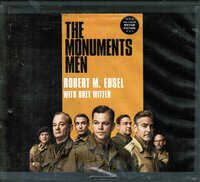Take a photo of a barcode or cover
615 reviews for:
The Monuments Men: Allied Heroes, Nazi Thieves, and the Greatest Treasure Hunt in History
Robert M. Edsel
615 reviews for:
The Monuments Men: Allied Heroes, Nazi Thieves, and the Greatest Treasure Hunt in History
Robert M. Edsel
A great story, unjustly overlooked for many decades despite its crucial role for so much of Europe's artistic heritage, but this account is marred by too many imagined conversations inserted throughout, eroding confidence in the narrative.
I actually finished this one awhile ago and found it as a "currently reading" title, but that's not true. I did enjoy reading this book and hope to revisit it again. There was a lot to learn and a lot that I would still like to learn.
The Monuments is a little long and overly data-filled, but he basic story is fascinating. I enjoyed reading it on my Kindle and learning more about specific pieces of art and individuals.
I expected a lot more out of this book than it delivered, thus the average rating. First, I noticed from the start that it lacked the coherency necessary to string together a decent narrative about a relatively unknown topic. This continues to plague the book throughout. (I would have also enjoyed some discussion about what when on in Italy. He author said that he kept it out because of length. I've read much longer books.)
Second, this book probably requires much closer attention than I gave.
Third, the narrator's affected accents are horrible. Seriously awful.
Fourth, once the narrative shifted to discussion of the rescue of pieces from the salt mine it found its feet.
Fifth, while the final outcome of the lives of the villains is interesting, morbidly fascinating really, it does not seem to fit the book.
I think I'll watch the movie and probably end up preferring it.
Second, this book probably requires much closer attention than I gave.
Third, the narrator's affected accents are horrible. Seriously awful.
Fourth, once the narrative shifted to discussion of the rescue of pieces from the salt mine it found its feet.
Fifth, while the final outcome of the lives of the villains is interesting, morbidly fascinating really, it does not seem to fit the book.
I think I'll watch the movie and probably end up preferring it.
I was quite surprised when I pulled up the book on goodreads to write a review and found that I had already read the book back barely a year and a half ago. Either that means that the book was remarkably unremarkable or I'm reading books too quickly now to generate a lasting impression or a combination of both. I honestly have no recollection of reading this book and it's not like some that I discover that I've read five or six years ago.
That being said, I am pleased to see that my opinion of the book did not really change. I noticed a couple different things this time around than before and my thought the time spent on what happened to the "villains" did not occur while reading the second time.
When I approached the book this time, I was excited to read it. I had just recently watched the movie via Amazon Prime (through a free trial add-on streaming service) and couldn't wait to delve back into that world. I ended up being a little let down. Something that I did not pay attention to the first time around really bothered me during this reading. As soon as I read Edsel's comment in the introduction that he had fictionalized some dialogue but kept it as close to what it likely was at the time, I became wary. This is a work of history, not historical fiction. Each time dialogue occurred throughout the book, in my mind, it lowered the quality of the historiography. Another thing that I did not note in my previous review was the difficulty to get into the narrative because of the frequent step backs in time to go over the back story of countless new characters. I know that many men were involved but it is possible to write a history such as this without trying to get the reader involved in the life story of every monuments men and a few "villians" from the German side. Once again it felt like Edsel was trying to fictionalize the story or at least create a narrative from which a movie could be made. Lastly, at one point Edsel included, in italics, the supposed thoughts of one of the Monuments Men. That bothered me immensely. That technique belongs to the world of authors of fictions not historiographers.
I finished this book wary to pick up the companion piece, Saving Italy. Spoiler alert: Edsel avoided the above mistakes and wrote a much better book.
That being said, I am pleased to see that my opinion of the book did not really change. I noticed a couple different things this time around than before and my thought the time spent on what happened to the "villains" did not occur while reading the second time.
When I approached the book this time, I was excited to read it. I had just recently watched the movie via Amazon Prime (through a free trial add-on streaming service) and couldn't wait to delve back into that world. I ended up being a little let down. Something that I did not pay attention to the first time around really bothered me during this reading. As soon as I read Edsel's comment in the introduction that he had fictionalized some dialogue but kept it as close to what it likely was at the time, I became wary. This is a work of history, not historical fiction. Each time dialogue occurred throughout the book, in my mind, it lowered the quality of the historiography. Another thing that I did not note in my previous review was the difficulty to get into the narrative because of the frequent step backs in time to go over the back story of countless new characters. I know that many men were involved but it is possible to write a history such as this without trying to get the reader involved in the life story of every monuments men and a few "villians" from the German side. Once again it felt like Edsel was trying to fictionalize the story or at least create a narrative from which a movie could be made. Lastly, at one point Edsel included, in italics, the supposed thoughts of one of the Monuments Men. That bothered me immensely. That technique belongs to the world of authors of fictions not historiographers.
I finished this book wary to pick up the companion piece, Saving Italy. Spoiler alert: Edsel avoided the above mistakes and wrote a much better book.
This was difficult to get through at first, in order to keep chronological order with all the events going on the storyline jumped all over Europe (and America, at times), but really got interesting when the various people were converging on the big find. Fascinating, heart-breaking time in history.
While not the most fascinating book, I enjoyed this story as it really documented all the efforts by Allied forces to reclaim artwork and preserve historic sites. The Nazis confiscated and destroyed so much artwork, and museums wouldn't hold nearly as many treasures without the work of this team. So many historic buildings are still standing today because of Allied accuracy during the bombings (they avoided Beethoven's house but everything on the block was blown up) and because of efforts to assess and rebuild immediately post-war.
adventurous
informative
sad
slow-paced
Interesting story, but the writing was a little dry.
There is something very comforting about reading about difficult times when going through difficult times (not that I will pretend a virus’s random victimization is the same as systematic slaughter) but beyond that, the idea that the things we want to preserve as a species, our artistic legacy, should be on the forefront of our minds even in difficult Times is one I take to heart. 30% of all museums are expected to close because of the pandemic. I sincerely hope that books like these can sway governments and citizens towards the need to keep them.
informative
slow-paced





